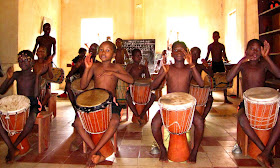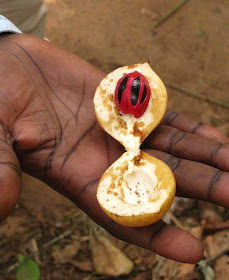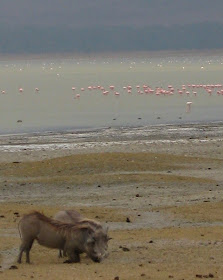Election updates!
So here are the updates from Guinea. We had presidential elections! When the initial election results were announced, the losing candidate’s supporters protested. When the police came out to quell the protests, it often got violent. The government declared a nation-wide state of emergency and imposed a 6 pm curfew—any vehicles on the roads after that time were stopped by police. Some of the worst violence was directly in the neighborhood of the Peace Corps compound, so we stayed hunkered down in the Peace Corps house for a few days. I was allowed to venture out as far as crossing the street to get my bean sandwich for breakfast, but even that was after making sure no gunshots had been heard recently. Fortunately, that only lasted for a few days, but it did cause casualties. You can read more on that here.
Some interesting photos:
My host brother from when I lived in Dubreka somehow got his hands on this sample election ballot. I think it’s well designed in that it takes into account that only about 30% of the country is literate—making the photos and colors necessary for the average voter! (That statistic courtesy the CIA World Factbook.).

Here’s one of the typical campaign billboards. I find it interesting and telling that there is a woman as part of Alpha Condé’s “rainbow coalition.” (The other candidate, Cellou Dalein Diallo, had no women in his campaign posse.)

Alpha Conde, the winner, was inaugurated on Tuesday, December 21. Heads of state from 13 African nations attended! In his speech as Guinea’s outgoing leader, General Sekouba Konaté rebuked other African leaders who have performed poorly in implementing transparent and fair elections. I thought this was great—taking the opportunity to shed light on the abuses of power that are glossed over in so many of these countries. We, the developed nations, often turn a blind eye because we would rather keep a place like Guinea stable so we can extract its oil/iron/aluminum ore, ignoring the shady internal politics as long as the man in charge gives us what we want. It was, in fact, my Guinean colleagues who disagreed with me on the subject of Konaté’s speech, saying that the inauguration was not the time to reprimand other leaders for their non-democratic performances; that this was a time to celebrate. I tend to think that any time is a good time to call out a lack of transparency. Right on, Sekouba.
Some good articles on the inauguration and our new man in charge, Mr. Conde, are here, here, or here.
And lastly, I have to share a joke that one of my Guinean co-workers at CAFODEC told me the other day:
A Chinese, an American and a Guinean are sitting around talking about elections. “In my country,” the Chinese man boasts, “we are able to know the results of an election within 24 hours after voting.”
“That’s nothing!” says the American. “In my country, we can know the results that very night.” The Guinean leans back and smiles.
“Well in my country,” he says, “our systems are so advanced that we know the results of the elections before they even happen.”
Microfinance fun
A small tidbit of good news is that although we still haven’t been allowed to go to our posts, I was allowed out of Conakry long enough to attend a national microfinance conference. It was interesting to watch, as Guinea’s microfinance sector is in such an early stage of development. The leaders here are really looking to surrounding countries—Benin, Senegal, Mali—for inspiration and guidance. There is currently SO much demand that goes unmet mainly due the microfinance institutions’ lack of loan capital. At the conference, we heard from a few women beneficiaries of micro-loans. One woman joined one of Guinea’s first microfinance establishments almost twenty years ago, when it was still just a project of the US Agency for International Development. She’s taken progressively larger loans, which have allowed her to buy land to farm and to start her own small business dying cloth, which supports her family. When she first told her story, it was in Soussou, one of the local languages. I couldn’t understand a thing, but she was so confident and expressive in her speech that I was totally captivated. She asked the new government to pay attention to Guinea’s microfinance sector and to support it so that other women can have the same opportunities she did.
My friend…
In other, much less politically charged or professional news, I have a friend! Let’s just say I am diversifying my overall friendship repertoire. I was walking to work one morning, and a young woman sitting on a bench on the side of the road enthusiastically called out a greeting to me. I was in a good mood, and greeted her back. She motioned me over, informed me that her name is Aminata, and that we should be friends. Cool, I thought! By friends, I assumed she meant we’d occasionally drink tea together on her bench on the side of the road and talk about the neighborhood happenings. That seemed just fine by me. She told me she’d known many of the past Peace Corps volunteers so I figured she’d be like a comfortable old buddy. I am sure hard up for friends here in Conakry—being in the Peace Corps house under a state of emergency is not so conducive to making friends. So I was open to and grateful for the opportunity to meet some neighbors!
About a week later, I get a call from Aminata. She said that she was at the bar on the little stretch of beach right behind the Peace Corps compound with friends, and that I should join them. I wasn’t feeling up to it that day, and so told her maybe next time.
The next weekend, I headed to the beach bar with a few other PCVs. We were planning to meet up with an American friend we hadn’t seen in some time, and I was very much looking forward to catching up with him. We were having a pleasant conversation, when Aminata comes up, crying out “Naboooouuuu!!! (my Guinean name) I was going to call you! I was looking for phone credit to call you!” Before I have a chance to say anything, she pulls up a chair at our table and introduces herself to my fellow PCVs. She simultaneously rubs the back of my neck in an odd, over-friendly sort of greeting. Then she tells the other PCVs how close she and I are, that I am her favorite friend, that we are the best of friends, and holds up her fingers crossed tight, indicating the unshakable bonds of our friendship. I believe Aminata and I had greeted each other in the street about three times at this point.
I didn’t want to be impolite to Aminata, but I really just wanted to catch up with the friend we hadn't seen recently. At particularly inopportune moments of our friend’s stories, Aminata would enthusiastically jump in, ask me something irrelevant, and I’d miss the point of the story. I even explained to her that we hadn’t seen this guy in a while, so I wanted to hear his stories. But by this time, she’s signaled over two more of her friends to join our table. “We should speak in French!” she says, “or you can teach me English!” Not exactly what I had in mind for the afternoon…
As time wears on, my fellow volunteers are giving me looks that say, “Hmmm, your friend here is persistent, non?” At one point when Aminata got up to visit with some other friends, the waitress took her chair away, to use at another table. Undaunted, Aminata quickly came back and procured a new one. All of our social signals and clues that in America say, “We’d really just like to catch up with each other today!” have gone completely over her head, as they often do when two very different cultures try to communicate. Aminata goes on to tell us how close she was with certain volunteers who were previously in Guinea. One of my PCV friends in our group had also previously been in Guinea, and she knows the fellows with whom Aminata kept company. “Oh yes,” my PCV friend notes, “those were the boys who got kicked out. And they slept with prostitutes.” I look over at Aminata, chain smoking proudly, and it all starts to come together. Prostitutes, and only prostitutes, would ever smoke in a bar in Guinea. Wellllll.
My new friend/prostitute faithfully remains at our table for the rest of our time there, waiting… until we all make our pleasant good-byes and head home. Aminata is friendly and outgoing, characteristics I appreciate, and I can’t tell if she wants to be my friend to hang out with me… or my fellow PCV friends of the opposite gender…
The next day, I was talking with another fellow volunteer who had previously served in Guinea. “Oh yes,” he confirms, “Aminata? She’s definitely a prostitute. Actually, she’s the one in charge, the Madam.” So, my first friend in Guinea—quite the entrepreneur! Gotta start somewhere, right? It’s going to be a beautiful friendship.
















































